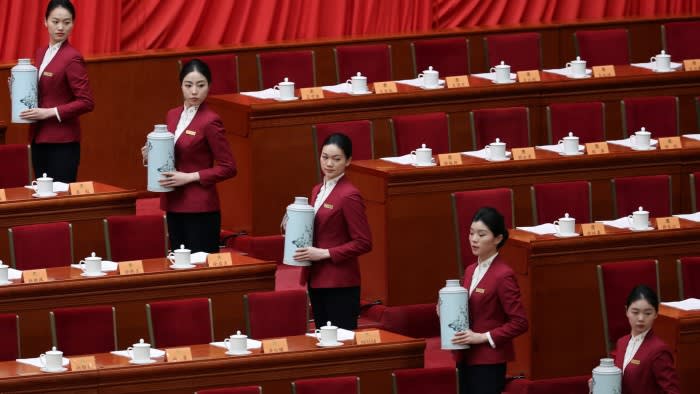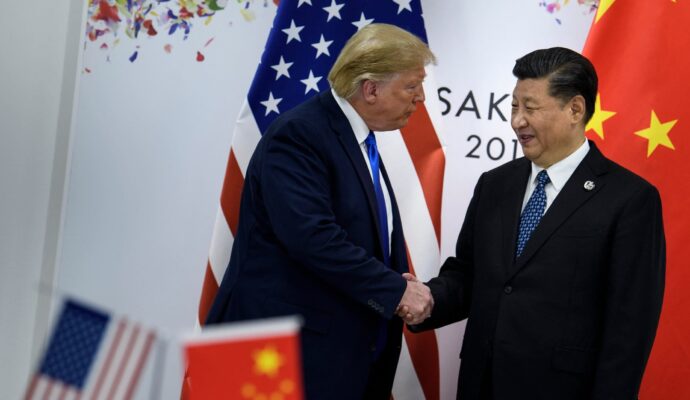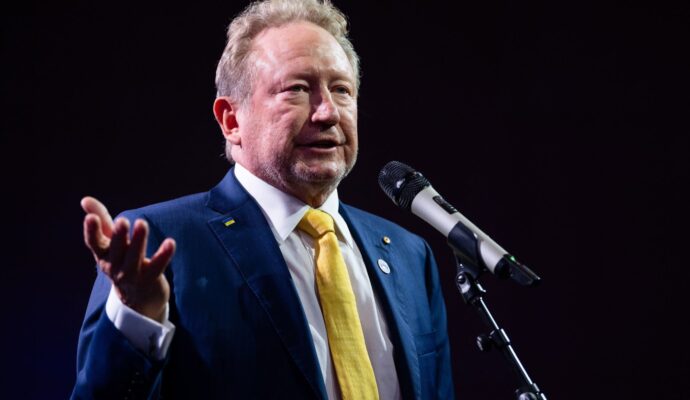
Unlock the Editor’s Digest for free
Roula Khalaf, Editor of the FT, selects her favourite stories in this weekly newsletter.
The writer is author of ‘Lotus’, a novel, and ‘Socialism is Great!’, a memoir
“Women hold up half the sky,” Mao Zedong famously claimed. But do they really? Take a look at this week’s annual session of the National People’s Congress, China’s top legislature and the country’s parliament, of a sort. There were plenty of women present in the Great Hall of the People, but most were serving tea. In 2024, actual female delegates accounted for only about 26 per cent of the almost 3,000 members.
So Chinese women are holding up just a quarter of the political sky. And further up the ranks, not even that. Currently, there is only one woman in the 25-member politburo, the Communist party’s leadership body, and its standing committee is a boys-only club.
Globally, the percentage of women in parliament is seen as an important indicator of their political participation, and China lags behind. It ranks 107 in the Global Gender Gap Report 2023, published by the World Economic Forum, down from 102 in 2022.
I blame the gendered structure and deeply rooted patriarchal culture, which have prevented women from advancing their political careers. A relative of mine recently retired from her position as the deputy head of a district in Nanjing. Long before she stepped down, she had stopped trying to climb up the ladder. No point, she explained, if you had not been earmarked by the party for potential advancement early on.
Nomenklatura, a system borrowed from the Soviets, functions as the Chinese Communist party’s main instrument in promoting and appointing cadres. It mainly relies on the top-down selection of nominees by the party instead of the candidates running voluntarily as in a democratic system.
In 2016 and 2017, Xinhui Jiang, an assistant professor at Nanjing University, conducted research on female representation in four county-level people’s congresses in central China’s Hunan and Hubei provinces. She discovered that male and female officials followed different paths: men were more likely to be in senior positions, women in grassroots positions where there are quotas covering gender and ethnic minorities.
To get anywhere in Chinese politics, you have to be a member of the Communist party. Currently, it boasts nearly 100mn members but less than 30 per cent are women. Furthermore, they are usually assigned to the so-called “feminine roles”, such as family planning, culture or education, while men are promoted to powerful positions like party secretary or head of the economy.
In the 1990s, Chen Muhua, China’s second female vice-premier, pushed for a quota system with at least one female leader in all layers of government up to the provincial level. In 2007, a 22 per cent quota for the National People’s Congress was introduced and applied the following year. Local governments also have their own gender quotas.
An affirmative policy is needed. In a paper published in China Quarterly, Jiang concluded that the quota system did have a positive effect on women, but it was only loosely observed.
One factor is China’s traditional gender roles, especially in the vast countryside. Many male villagers still believe decent women should not take an interest in politics; others cite the saying that “women have long hair and short wisdom”. Very few women are elected head of the village; a paper published in Open Edition Journals in 2007 put the figure at 1 per cent. That may have increased a few points, but data are scarce.
The political under-representation of women in China is not good for the country’s sustainable development. This era of a shrinking population demands policies that are fair or even favourable to women. Beijing should introduce institutional reforms to allow male and female cadres equal career opportunities, and increase the gender quota at both local and national levels to at least 30 per cent, a “critical minority”, and extend it beyond the NPC. The system should be strictly implemented.
Women deserve half the political sky.


